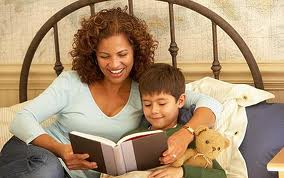Family-School Journals
There are three types of journals Allen discusses that are all great ways for students, families, and teachers to communicate. They all vary as far as how much time it would take on the teachers part, but they are all great ways for teachers to partner with families. Journals help strengthen reading and writing skills and give families a chance to be creative in their own style.
   | Home Reading Journals With this journal, parents will read with their child every night of the week except for Friday. The reading is meant to be flexible in that sometimes the child will want to read the whole book and other times the book will be to difficult and he/she will need the parents help. After the reading, the parent and the child can work together to answer the reading questions. This is also the place to write to the teacher if the parent has questions about their child's reading. Once again, the child may want to do all of the writing or may want the parent to do all of the writing; either way is fine. There is no single right way to do the reading and journaling. Four days a week may be a lot, but parents and children should strive for at least two or three days to read and journal. The child will then turn in the journal and the teacher will respond with at least a sentence or two. This journal is a great way for the parents to collaborate with the teacher on strengths and weaknesses that their child has in reading or writing. Weekend Journals This journal is sent home on Friday and brought back on Monday. The child will write in the journal to their parents about at least one thing at school. The parent will read it and respond with a message of their own. Not only can parents write back but siblings, grandparents, cousins, or any other relative who wants to participate. The response can be written in any language and shouldn't take more than fifteen minutes to write. The child will turn in the journal and the teacher will read the messages and reply. The parent and child will then read the message together and start the whole process all over again. The teacher can also make it more structured by discussing what questions the students will ask their parents in their journals. It's a great idea to have the students read their parents response on Monday, out loud for the class. The students will learn much about each other over the course of the year. Family Message Journals Allen very briefly mentions this type of journal but I think that it could be a starting point if the teacher is worried about having enough time to respond to everyone's journal entry. This type of journal is back and forth between parents and their child only, not the teacher. This is still a great way for students to practice their writing and keep their parents informed of what the child does in school and if he is struggling with any writing concepts. The students can read their parents response as well, to create a classroom discussion.
|